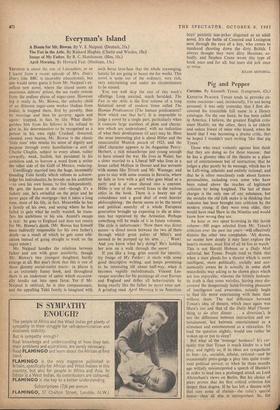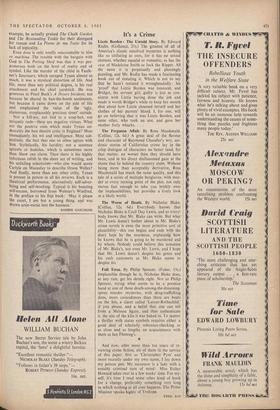Pig and Pepper
Curtains. By Kenneth Tynan. (Longmans, 42s.)
KENNETH PEACOCK TYNAN tends to provoke ex- treme reactions—and, incidentally, I'm not being personal; it was only yesterday that I first dis- covered his irresistible full name in a library catalogue. On the one hand, he has been called in America, I believe, the greatest English critic since Hazlitt; on the other, there is an elderly and sedate friend of mine who hissed, when he heard that I was becoming a drama critic, that he hoped I wouldn't start writing 'like that pig Tynan.'
Those who react violently against him think that they are doing so for three reasons: that he has a gloomy idea of the theatre as a place not of entertainment but of instruction; that he judges a play purely by its message, which has to be Left-wing, atheistic and entirely rational; and that he is often mercilessly rude about famous personalities, including even some who have been raised above the reaches of legitimate criticism by being knighted. The last of these charges is the only one of any substance, but the mistake the old folk make is in thinking that rudeness has been brought into criticism by the modern young; if they were even older, they would have read Shaw in the Nineties and would know how wrong they are.
An hour or two spent browsing in this lavish volume-500 pages selected from Mr. Tynan's criticism over the past ten years—will effectively dismiss the other two complaints. 'All drama, no matter how deeply it may later explore the heart's recesses, must first of all be fun to watch.' This is not Harold Hobson or a Daily Mail editorial, but Tynan. People tend to think that when a man pleads for a theatre which is more intelligent, more politically, socially and eco- nomically aware he is actually in some dark masochistic way asking to be shown plays which are less enjoyable; whereas the bitterly hedonis- tic truth is that some weirdies, having once dis- covered the dangerously habit-forming pleasures of intelligence and awareness, actually begin to find life more entertaining with them than without them. The real difference between Tynan's idea of theatre, which once again was Shaw's too and that of the Daily Mail ('Some- thing to do after dinner . . . a diversion'), is not the difference between instruction and en- tertainment, but between entertainment as a stimulant and entertainment as a relaxation. To load the question slightly, would one rather be woken up or put to sleep?
But what of the 'message' business? It's cer- tainly true that Tynan is much kinder to a bad play, and rightly so, if its ideas are sympathetic to him—i.e., socialist, atheist, rational—and he occasionally press-gangs a play into quite irrele- vant political service, as when he three months ago wilfully misinterpreted a speech of Hamlet's in order to lead into a prolonged attack on Lord Altrincham's views on Berlin. But his choice of plays proves that his first critical criterion lies deeper than dogma. If he has left a theatre with that rare sense of elation—the critic's special bonus—then all else is unimportant. So, for
example, he actually praised The Chalk Garden and The Resounding Tinkle for their disregard for reason and La Plume de ma Tante for its lack of topicality.
Even deus is only totally unacceptable to him ex machina. The trouble with the bargain with God in The Potting Shed was that it was pre- posterous both on the level of reality and of symbol. Like the murder of the child in Faulk- ner's Sanctuary, which enraged Tynan almost as much, it was a mystical distortion of life. And life, more than any political dogma, is his real attachment and his chief yardstick. He was generous to Pearl Buck's A Desert Incident, not because he shared its ban-the-bomb sentiments, but because it came 'down on the side of life and emphasised the value of the 'ugly, clamorous, irreplaceably precious street' outside.
Not a kill-joy, not tied to a soap-box, not uniquely rude—these are negative virtues. What are the positive ones which make Tynan un- deniably the best theatre critic in England? Most immediately, his wit and intelligence. Most sub- jectively, the fact that one so often agrees with him. Stylistically, his lucidity; not a sentence sprawls or hunches, which is sometimes more than Shaw can claim. Then there is his highly infectious relish in the sheer act of writing, and his unfailing eclecticism—who else would quote Carlyle on Macaulay to. describe Orson Welles? And finally, more than any other critic, Tynan Is present in person in all his reviews. Each is a theatrical performance, alternatively self-adver- tising and self-mocking. Typical is his boasting self-excuse, borrowed from Webster's Winifred, In the preface to his first book : 'May it please the court, I am but a young thing. and was drawn arsie-varsie into the business.'
BAMBER GASCOIGNE















































 Previous page
Previous page